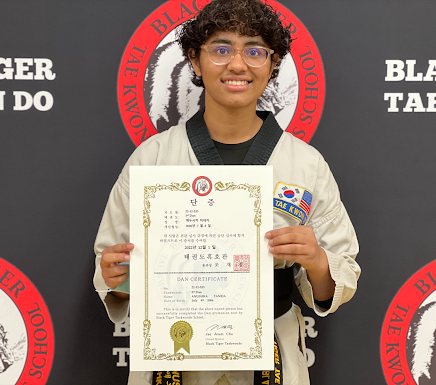
Anushka Taneja
“You’re suffering, exercising a lot, memorizing a bunch of forms—but you’re doing it together.”
Anushka Taneja: When I was around eight, I was going to Safari Kids regularly, and because [the Taekwondo studio] was right next door, my mom was telling me that I should pick up the sport and signed me up soon after. I was super nervous because I had never done martial arts before, and I wasn’t really sure if I would enjoy it.
I eventually got used to the physical demand of it, and I got my first degree [black belt] when I was thirteen. Currently, I’m a third degree [black belt] training to be a referee. I actually got my certification as a D Level referee for the United States just today. I learned a little bit [of refereeing] at the [Taekwondo] place I go to and from the two-day seminar I attended at the beginning of March. After, I went through two guides online and got my official D Level certification. The first time I’m going to officially referee is actually this month on April 22.
Something about Taekwondo is that you have to be very accurate and attentive to detail, and these little details are actually very noticeable, especially to other people that do Taekwondo, and because of this, there’s always more to improve on—minute details to perfect. For example, you lose points if your foot is 90 degrees rather than 45 degrees—things like that. There’s a lot of stuff that you have to watch out for, and you become more impressed with yourself later on because of the fact that you remembered such a miniscule detail; there’s a lot of motions going on at once, but despite that, you remembered to account for all those little details as well.
Around two weeks before our testing [for the next level belt], we had nine-hour training days where they would drill everything into our memory, and those were honestly the best days because I always had a friend doing it with me. Even though you’re exercising a lot and suffering through it, you were doing it together, so it was actually quite fun.
But, the thing is, a lot of people actually quit when they’re at the higher level belts or when they’ve reached first degree black belt, and I feel like that’s really disappointing. A lot of people praise black belts and everything, and it’s definitely a huge accomplishment, but there’s a lot more after that. It’s disappointing that [the] black belt is advertised as mastery because you’re basically still a student. Actually, [black belt] degrees one to three are still considered student-level, but many treat black belt as a confirmation that they’ve mastered the art, when they really haven’t.
I actually also gained a lot of confidence from Taekwondo. First of all, there’s parts of forms where you’re required to yell or stomp loudly when you’re doing a certain action, and on those parts, if you don’t stomp or “kihap” (a shout to release one’s energy in Taekwondo) loud enough, you lose a point. They literally teach you to be confident enough to yell in front of everyone. When I made my own form for my third degree test, I had to present it to everyone there—all the black belts and the three masters that were watching. I had to pick the music, create the form to go with that music, and I had to present it. You have to have enough confidence to do that in front of everyone, even if you’ve never made a form before.